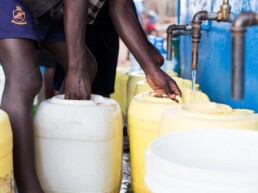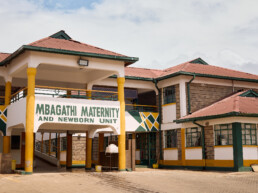The Challenge
Residents in Kenya’s informal settlements face intertwined challenges that undermine their health and well-being. Most households lack access to clean, treated drinking water, with SHOFCO’s preliminary mapping estimating that only about 50% of households have access to water sources—many of which are inadequately treated. Sanitation access remains even less understood. As a result, diarrheal diseases are among the leading causes of death for children under five.
Coupled with water challenges are barriers to healthcare access. High HIV/AIDS prevalence, chronic malnutrition, and infant mortality rates in areas like Kibera outpace national averages, while uptake of available health services remains low due to costs and poor infrastructure. Mental health remains a silent crisis, exacerbated by societal stigma and limited resources. Lack of community education on sanitation, hygiene, and health-seeking behaviors further perpetuates cycles of illness, poverty, and lost potential.
The Solution
A Holistic Approach to Health and Well-Being
SHOFCO’s integrated approach addresses these challenges by combining health system strengthening, clean water access, mental health support, and community education to promote comprehensive care.
- SHOFCO clinics: SHOFCO’s clinics in Kibera and Mathare provide affordable primary and preventive care, focusing on maternal and child health, HIV/AIDS treatment, and mental health support. Community Health Workers conduct home visits, offering education and early disease detection. The clinics also integrate care for survivors of sexual and gender-based violence (SGBV), connecting them to vocational training and employment opportunities.
- Clean water access: SHOFCO’s innovative aerial piping system delivers clean water to thousands, reducing the spread of waterborne diseases. Women-led water kiosks ensure safe and affordable access while mitigating risks of SGBV at water points.
- Sanitation infrastructure: SHOFCO supports the construction of gender-specific pit latrines in public schools, creating safer, more hygienic environments that improve overall sanitation, reduce school dropouts linked to menstrual health challenges and mitigate risks of SGBV.
- Mental health support: mental health workshops and counseling services support survivors of SGBV, while trained Gender Champions drive mindset shifts to prevent abuse. Programs integrate financial independence as a core strategy to reduce vulnerability.
- Community education and engagement: health clubs in schools teach hygiene and sanitation, promoting healthier behaviors. Clean, safe sanitary facilities reduce school absences, particularly for girls, while life skills training fosters resilience and leadership.
This comprehensive model not only meets immediate healthcare needs but also strengthens local systems, enhances resilience, and fosters sustainable community-led solutions.
The Outcomes
SHOFCO’s holistic programs yield transformative outcomes for individuals and communities.
Short-Term
- Increased dignified access to clean water reduces the incidence of waterborne diseases.
- Communities gain awareness of sanitation and hygiene practices, improving day-to-day health.
- Survivors of SGBV receive immediate support and are connected to Sustainable Livelihoods programs.
Medium-Term
- Local clinics and healthcare systems adopt SHOFCO’s innovative approaches, improving the quality and reach of health services.
- Community-led initiatives foster collective action in health and well-being, promoting greater social cohesion and responsibility.
- Improved sanitation and access to clean water create healthier environments, especially in schools, leading to sustained improvements in public health.
Long-Term
- Reduced mortality and morbidity rates in informal settlements.
- Women and youth contribute to thriving communities through economic independence and leadership.
- A self-sustaining model of health and resilience emerges, led by empowered community members.
The Impact
4,497
mental health ambassadors trained across four counties
0%
mother to child HIV transmission at SHOFCO clinics, compared to 15% nationally
40k
people accessing safe and clean water daily


